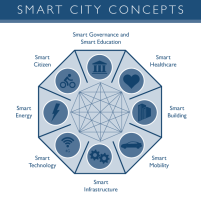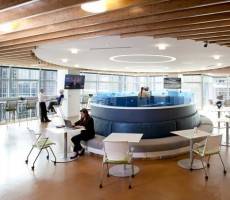November 26, 2014
Next ten years will see a surge of activity in new smart cities era
 Researchers Frost & Sullivan are promoting a study of the world’s smart cities which predicts that the global market will be valued at US$1.565 trillion by 2020. The report also claims that there will be a minimum of 26 smart cities worldwide by 2025 with more than half in Europe and North America. By 2025, nearly three fifths of the world’s population, or 4.6 billion people, will live in an urban setting and in developed regions, this figure could run to over 80 percent. This new era of urbanisation will force planners to radically rethink how they create cities, develop digital infrastructure and provide services to residents in a sustainable manner across a range of key parameters. The report defines smart cities as those built around ‘smart’ and ‘intelligent’ solutions and technology that lead to the adoption of at least 5 of 8 key parameters—energy, building, mobility, healthcare, infrastructure, technology, governance and education, and citizen.
Researchers Frost & Sullivan are promoting a study of the world’s smart cities which predicts that the global market will be valued at US$1.565 trillion by 2020. The report also claims that there will be a minimum of 26 smart cities worldwide by 2025 with more than half in Europe and North America. By 2025, nearly three fifths of the world’s population, or 4.6 billion people, will live in an urban setting and in developed regions, this figure could run to over 80 percent. This new era of urbanisation will force planners to radically rethink how they create cities, develop digital infrastructure and provide services to residents in a sustainable manner across a range of key parameters. The report defines smart cities as those built around ‘smart’ and ‘intelligent’ solutions and technology that lead to the adoption of at least 5 of 8 key parameters—energy, building, mobility, healthcare, infrastructure, technology, governance and education, and citizen.























December 3, 2014
Focus on the wellbeing of the occupants of the office, not that of the building
by Maciej Markowski • Comment, Facilities management, Wellbeing, Workplace
More →